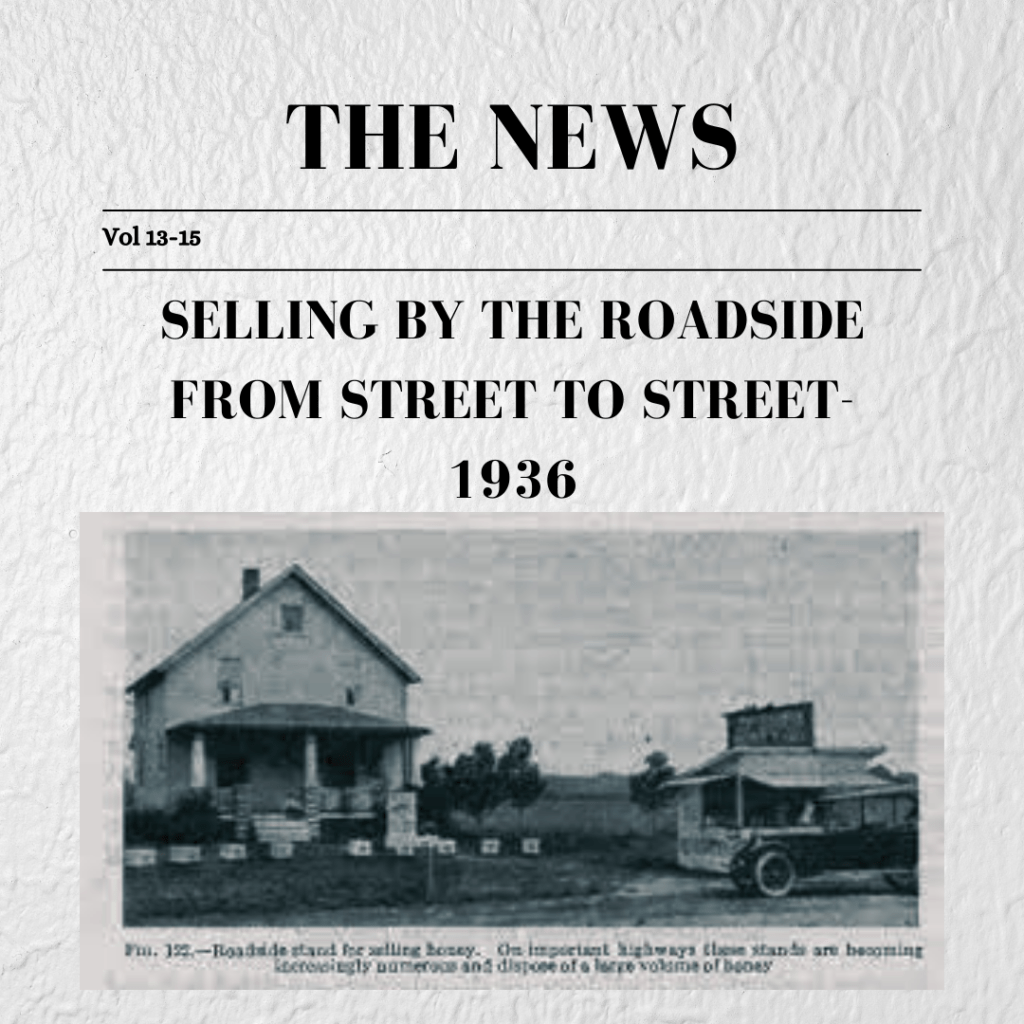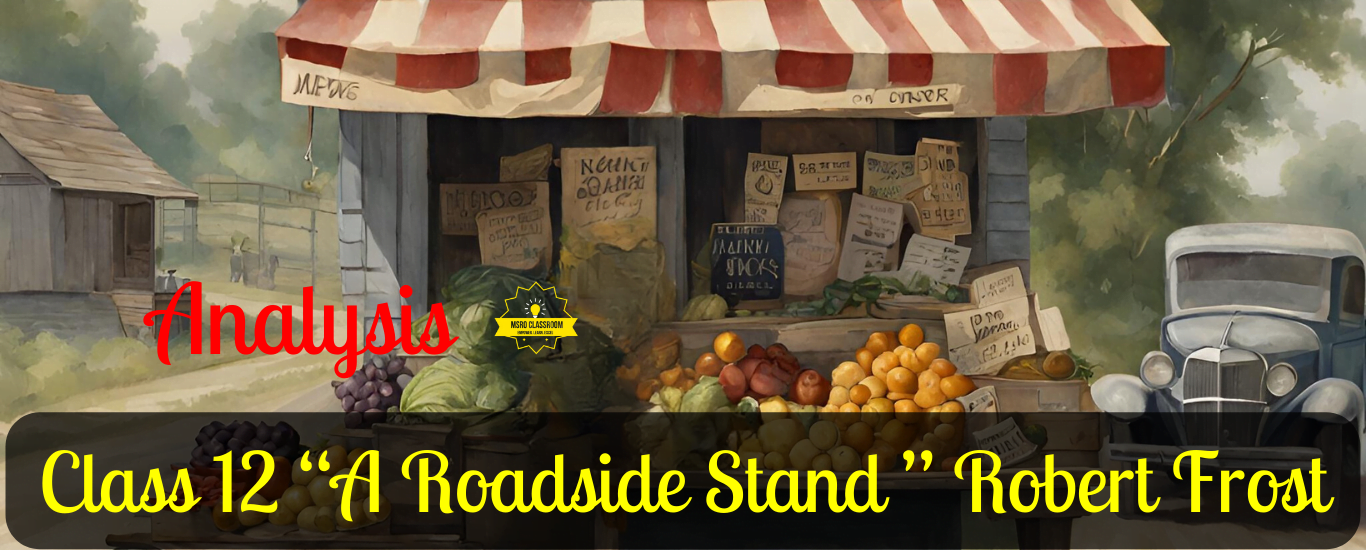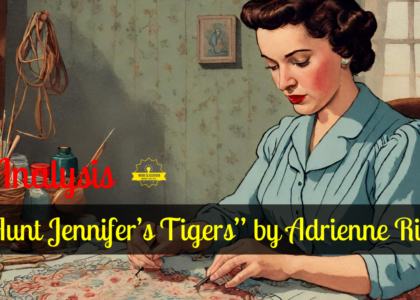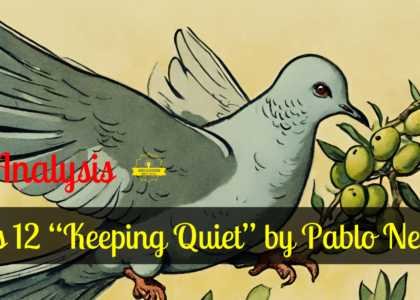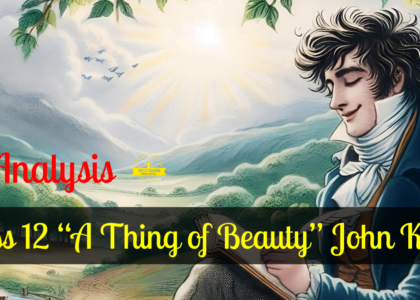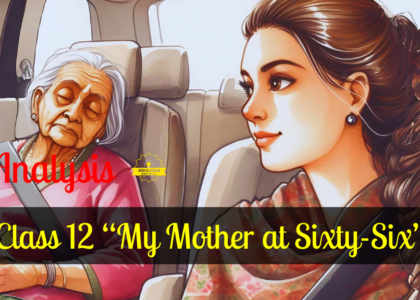Poem 4- Robert Frost’s ‘A Roadside Stand’ Summary, Theme, Line-by-Line Explanation, Stanza Wise Explanation, Literary Devices, Textbook Exercises and Extract-Based Questions.
Poem 4- A Roadside Stand by Robert Frost:
Robert Frost
Robert Frost (1874-1963) , an iconic American poet, masterfully captured nature’s essence and the human experience through his verses.
Frost’s distinct style blends simplicity with profound meaning, using rural settings to delve into universal truths.
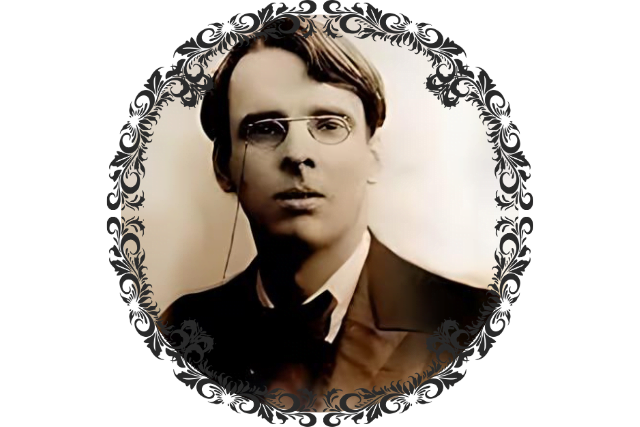
Table of Contents
Next on Flamingo: Poem 3-A Thing of Beauty, Poem 5-Aunt Jennifer’s Tigers,
Supplementary Reader: Class 12 ‘Vistas‘
A Roadside Stand- 1936
“…As Robert Lee Frost’s fame and wealth grew during the “roaring twenties”, his poetry became increasingly enmeshed in social and political issues. Producing and selling art that embodied Yeats’s “unity of being”, though, could be as hard as making a decent income from cultivating apple trees. Frost was reminded of this during the summer of 1926 on his South Shaftsbury farm when he observed Carol and Lillian trying to sell their produce at a roadside stand. He later wrote A Roadside Stand out of sympathy for their efforts.”
‘A Roadside Stand’ was first published in Atlantic Monthly, 1936-06
-The Life of Robert Frost: A Critical Biography, First edition, Henry Hart
Vocabulary:
| Artless: Without guile or cunning; innocent or naive. Bound: Heading or moving in a particular direction. Crook-necked: Having a curved or bent neck or shape. Dole: A generous gift or portion of something, often given as relief or aid. Kin: Relatives or family members. Lingers: To remain or stay in a place longer than necessary. Lurk: To lie in wait, often with sinister intent. Marred: To impair the appearance or quality of something Plow: To turn over the soil using a plough tool, typically in preparation for planting crops. Pled: To make an earnest appeal or request. Quarts: Unit measurement for volume, equal to a quarter of a gallon. Requisite: Necessary or essential. Sane: Mentally healthy or rational. Stroke: A single, decisive action or event. Squeal: A sharp, high-pitched cry or sound. Thoroughfare: A main road or public highway. Warts: (Here) A small, hard growth or protrusion on the surface of something, such as a plant or vegetable. Wits: Mental faculties; the ability to think and reason. |
Summary “A Roadside Stand”:
Robert Frost’s “The Roadside Stand” critiques urban-rural disparities, symbolised by the stand seeking urban resources amid rural struggle. It highlights societal neglect, unfulfilled promises, and rural isolation, contrasting urban affluence with rural hardship. Interactions at the stand reflect urban apathy. The poem ends with the speaker’s conflict: condemning rural suffering but empathising. It portrays societal inequality, yearning, and the urban-rural divide.
The stand, a metaphor for economic challenges, serves as a plea for support from the urban population. The speaker expresses resentment and longing for city money, controlled by those in power. The poem captures rural dwellers’ sadness and frustration, which they feel as if they are ignored by urban society. It reflects the desire for relief from difficulties, even suggesting a fantasy of someone ending their suffering. The poem evokes complex emotions, including resentment, longing, and a yearning for change.
Central Idea: A Roadside Stand:
The central idea of “A Roadside Stand” by Robert Frost revolves around rural struggle and urban neglect. The poem portrays the desperation of rural folk who run a roadside stand, hoping for city money to improve their lives but often facing indifference or exploitation from passing urbanites.
Frost criticises the societal structures widening this divide, highlighting the disparity between urban abundance and rural poverty. The poem also reflects on the longing for relief from suffering, whether the rural dwellers’ longing for economic stability or the speaker’s contemplation of the ultimate release from pain. It explores economic inequality, societal neglect, and the yearning for a better life.
Explanation “A Roadside Stand”:
- ‘The Roadside Stand’ by Robert Frost is a poignant and somewhat satirical poem that reflects on the struggles and aspirations of a rural family trying to survive by operating a modest roadside stand selling their produce. The poem explores themes of economic hardship, the encroachment of modernity on traditional rural life, and the desire for a better future.
- The poem begins by describing a small old house with a new shed, set by the roadside where the traffic rushes. This is a humble roadside stand where the family sells their goods, but it’s clear that they are struggling. The stand pleads for some money, not as a handout but as a way to sustain their livelihood and support the city’s growth.
- Frost criticises the indifference of passing motorists who hurry by, seemingly unaffected by the simple charm of the stand. The signs are described as amateurishly made, advertising wild berries and squash with an unpolished, “artless” quality. The poem suggests that the urban world views these rural efforts as quaint but insignificant, overlooking the value of their labour and produce.
- The poem takes a turn when the speaker expresses frustration with the state of affairs. He portrays a situation where rural families are being bought out and moved to villages far from their land, where they no longer have to think for themselves. The poem hints at the patronizing attitude of those in power who believe they know what’s best for these families, and the desire for an easier life might not be what the families genuinely need or want.
- The speaker conveys a sense of isolation and longing for recognition. He mentions the hopeful anticipation of a potential customer stopping by to inquire about the farmer’s prices. The disappointment of the farmer when cars stop only for unrelated reasons symbolises the disconnect between the rural way of life and the concerns of the urban world.
- The poem closes with a conflicted reflection by the speaker. On the one hand, he empathises with the pain of the struggling rural families and considers the relief it might bring to put them out of their suffering. On the other hand, he acknowledges the uncomfortable thought of being in the same position, where someone else decides what’s best for him.
- In ‘The Roadside Stand,’ Frost skillfully captures the complex emotions of those living on the fringes of society, dealing with economic challenges and yearning for a better life, all while questioning the role of those in power and the impact of their decisions. The poem resonates with empathy, the loss of autonomy, and the clash between rural and urban values.
Stanza-Wise Analysis of A Roadside Stand:
“The little old house was out with a little new shed
In front at the edge of the road where the traffic sped,
A roadside stand that too pathetically pled,
It would not be fair to say for a dole of bread,”
The poem opens with a vivid description of the setting—a “little old house” juxtaposed against a “little new shed.” The contrast between old and new suggests a changing landscape. The “roadside stand” sits at the road’s edge, a vulnerable spot where fast-moving “traffic sped.” This sets the scene of modernity and urbanisation encroaching on the rural space. The personification of the stand as “pathetically pled” creates an image of desperation, highlighting its economic struggles. The phrase “not fair to say for a dole of bread” hints at the stand’s need for financial support beyond mere charity.
“But for some of the money, the cash, whose flow supports
The flower of cities from sinking and withering faint.
The polished traffic passed with a mind ahead,
Or if ever aside a moment, then out of sorts
At having the landscape marred with the artless paint
Of signs that with N turned wrong and S turned wrong”
These lines deepen the analysis of the stand’s financial struggle. It’s not seeking charity but rather a share of the economic prosperity that “supports the flower of cities.” The contrast between the struggling rural stand and the flourishing urban centres becomes more pronounced. The “polished traffic” represents the modern urban world, moving relentlessly with a forward-focused mindset. The traffic’s annoyance at the “artless paint” of the signs highlights the tension between commercial intrusion and natural beauty. The imagery of signs with “N turned wrong, and S turned wrong” emphasises the stand’s homemade, imperfect nature.
“Offered for sale wild berries in wooden quarts,
Or crook-necked golden squash with silver warts,
Or beauty rest in a beautiful mountain scene,
You have the money, but if you want to be mean,
Why keep your money (this crossly) and go along.”
These lines present the offerings of the roadside stand: “wild berries in wooden quarts” and “crook-necked golden squash with silver warts.” These descriptions evoke a vivid picture of the rural products being sold. The juxtaposition of the natural imagery with the harsh reality of commerce reflects the clash between authenticity and profit. The stand also offers “beauty rest in a beautiful mountain scene,” a subtle critique of attempting to sell nature itself. The speaker’s accusation of being “mean” speaks to their frustration at the lack of patronage from passing urban travellers.
The hurt to the scenery wouldn’t be my complaint
So much as the trusting sorrow of what is unsaid:
Here far from the city we make our roadside stand
And ask for some city money to feel in hand”
Here, it marks a shift in the speaker’s tone. They express that the harm to the scenery is not their primary concern. Instead, they lament the rural community’s silent pain and unexpressed longing. The “trusting sorrow of what is unsaid” captures the unvoiced struggles of the villagers. The phrase “city money” highlights the disparity between the urban and rural economies, with the villagers seeking a share of urban prosperity to uplift their lives.
“To try if it will not make our being expand,
And give us the life of the moving-pictures’ promise
That the party in power is said to be keeping from us.
It is in the news that all these pitiful kin
Are to be bought out and mercifully gathered in”
The speaker delves into the villagers’ aspirations. They desire economic improvement that would make their “being expand,” echoing the longing for a better life. The mention of “moving-pictures’ promise” alludes to the allure of the cinema and the modern lifestyle portrayed in media. This desire for progress is contrasted with the political reality, where the “party in power” is believed to withhold promised benefits. The notion of the “pitiful kin” being “bought out” and gathered suggests a sense of displacement and a lack of agency.
“To live in villages, next to the theatre and the store,
Where they won’t have to think for themselves anymore,
While greedy good-doers, beneficent beasts of prey,
Swarm over their lives enforcing benefits
That are calculated to soothe them out of their wits,
And by teaching them how to sleep they sleep all day,
Destroy their sleeping at night the ancient way.”
These lines expand on the villagers’ fate. The idea of living “next to the theatre and the store” implies a forced assimilation into modern urban life. The concept of not having to “think for themselves anymore” reflects the loss of self-sufficiency and autonomy. The metaphor of “greedy good-doers” and “beneficent beasts of prey” highlights the paradoxical nature of those who claim to help. The beneficiaries are swarmed by these forces, which enforce superficial “benefits” designed to numb their individuality. The line “by teaching them how to sleep, they sleep all day” highlights the dehumanising effect of this imposed change. The phrase “destroy their sleeping at night the ancient way” suggests the erosion of traditional ways of life and values.
“Sometimes I feel myself I can hardly bear
The thought of so much childish longing in vain,
The sadness that lurks near the open window there,
That waits all day in almost open prayer
For the squeal of brakes, the sound of a stopping car,
Of all the thousand selfish cars that pass,
Just one to inquire what a farmer’s prices are.”
The speaker shifts the focus to their emotional turmoil. They are deeply affected by the villagers’ unfulfilled desires, which they describe as “childish longing in vain.” The sadness that “waits all day in almost open prayer” reflects the villagers’ hopeful anticipation of attention from passing cars. The imagery of waiting for the “squeal of brakes” and the “sound of a stopping car” encapsulates the villagers’ yearning for acknowledgement and patronage. The repetition of “selfish cars that pass” emphasises urban traffic’s fleeting and self-centred nature. The plea for a single car to “inquire what a farmer’s prices are” highlights the villagers’ need for economic support and interaction.
“And one did stop, but only to plow up grass
In using the yard to back and turn around;
And another to ask the way to where it was bound;
And another to ask could they sell it a gallon of gas
They couldn’t (this crossly); they had none, didn’t it see?”
The speaker describes the fleeting encounters with the passing cars. One car stops, but only to disrupt the grass as it manoeuvres. This suggests a need for more regard for the stand’s purpose. Another car merely seeks directions, emphasising the practicality of the urban travellers’ concerns. The mention of “sell it a gallon of gas” highlights the detachment between the urban travellers’ needs.
“No, in country money, the country scale of gain,
The requisite lift of spirit has never been found,
Or so the voice of the country seems to complain,
I can’t help owning the great relief it would be
To put these people at one stroke out of their pain.
And then next day as I come back into the sane,
I wonder how I should like you to come to me
And offer to put me gently out of my pain.”
In this final stanza, the speaker reflects on the perceived inadequacy of “country money” and the local economic scale. The phrase “requisite lift of spirit” alludes to rural life’s lack of substantial improvement or economic progress. The “voice of the country” symbolises the collective dissatisfaction and longing for change. The speaker then presents a conflicted thought: a temptation to drastically alleviate the villagers’ suffering by “putting them at one stroke out of their pain.” This sentiment echoes their earlier frustration with the villagers’ plight.
However, the stanza takes a poignant turn. The speaker acknowledges the complexity of such a decision, admitting their doubts and following the reflective process. They envision a scenario where someone would offer to “put [them] gently out of [their] pain.” This hypothetical scenario makes them reconsider their previous impulse, highlighting the empathetic realisation of the gravity of such decisions.
In the poem’s conclusion, Robert Frost masterfully navigates the internal conflict of the speaker, shifting from frustration to introspection and empathy. The final stanza demonstrates the complexity of societal issues, moral dilemmas, and the human capacity to empathise with the struggles of others. ‘The Roadside Stand’ presents a profound commentary on the clash between urbanisation and rural life, economic disparities, and the longing for understanding and relief through its vivid imagery, contrasting themes, and contemplative voice.
Title and Setting:
The title “The Roadside Stand” immediately establishes the central location of the poem. This seemingly simple setting becomes a microcosm that reflects more prominent societal and economic themes. The stand represents the intersection between rural life and urban development, where the clash between tradition and progress is evident.
Tone and Mood:
The tone of the poem is reflective and melancholic. Frost conveys a sense of nostalgia for a simpler past while acknowledging the challenges of the present and the uncertainties of the future. As the poem progresses, the mood shifts from contemplative to frustrated and bitter.
Narrative Voice and Introspection:
The poem is presented through the first-person narrative voice, allowing readers to intimately connect with the speaker’s thoughts and emotions. The reflective tone emphasises the personal nature of the struggle and the deep contemplation of societal issues. This narrative choice draws readers into the speaker’s perspective and encourages reflection on the themes.
Themes ‘A Roadside Stand‘:
- Urbanisation and Modernization:
The poem portrays the encroachment of urban life upon the rural setting. The “polished traffic” and the “flower of cities” represent the bustling modern world that contrasts with the simplicity of the countryside. The mention of “moving-pictures’ promise” alludes to the allure of urban life and technological progress.
- Economic Struggles:
The “roadside stand” is a poignant symbol of the economic difficulties faced by the rural population. The stand’s plea for money and the depiction of signs offering goods for sale highlight the struggle for financial stability.
- Loss of Authenticity:
The “artless paint” on the signs and the commodification of nature through the sale of berries and squash suggest a loss of authenticity and commercialisation of the natural world.
- Trust and Disappointment:
The poem explores the theme of trust and disappointment from unfulfilled expectations. The residents hope for city money to “make our being expand” and for the promises of the “party in power” to be fulfilled, but the disappointment is palpable.
- Desire for Relief:
The poem touches on the desire for release from suffering, both economic and emotional. The speaker, at times, considers the relief it would be to put the struggling rural people “out of their pain.” This theme reflects the speaker’s internal conflict.
Imagery and Description:
Frost’s vivid imagery draws the reader into the scene. The “little old house” juxtaposed with the “little new shed” highlights the contrast between the established past and the encroaching present. The stand is “pathetically pled,” evoking a sense of vulnerability and desperation. It symbolises the struggle for survival and the need for economic sustenance.
Why is ‘A Roadside Stand’ a multi-layered poem?
1. Irony and Critique of Urbanization:
Frost employs irony to critique the effects of urbanisation. The “polished traffic” passing by contrasts with the “artless paint” of the commercial signs. While the traffic moves swiftly and thoughtlessly, the signs disrupt the natural landscape and signify the commercialisation of rural beauty. This irony highlights the loss of authenticity and connection to the land in the face of commercial interests.
2. Economic Struggle and Power Dynamics:
The poem addresses the economic challenges rural communities face as they grapple with the intrusion of urban influences. The phrase “flower of cities” refers to the prosperity urban centers enjoy, supported by money flow. The stand’s plea for “some of the money” highlights the economic disparities between rural and urban areas. The assertion that the “party in power” keeps promises of prosperity from the rural populace implies a critique of political manipulation and economic inequality.
3. Critique of Well-Intentioned Intervention:
Frost critiques well-intentioned intervention and the imposition of external solutions. The “greedy good-doers” and “beneficent beasts of prey” are depicted as imposing their ideas of progress onto the rural community. This imposition robs the villagers of their autonomy and self-sufficiency, exemplified by the phrase “teaching them how to sleep.” This critique resonates with broader discussions about the impact of urban influence on traditional ways of life.
4. Inner Conflict and Moral Dilemma:
The speaker’s inner conflict forms a significant part of the poem. The desire to alleviate the villagers’ suffering through a swift solution reflects the speaker’s compassion. However, taking such a drastic step also highlights the moral complexity of such a decision. This conflict adds depth to the speaker’s character and reflects the complexity of addressing societal issues.
In conclusion, ‘The Roadside Stand’ is a layered poem that delves into themes of economic struggle, the impact of urbanisation, the tension between tradition and progress, and the complexities of social intervention. Frost’s use of imagery, irony, and introspection creates a rich and thought-provoking exploration of the human experience in the face of societal change. The poem serves as a reminder of the intricate relationships between people, landscape, and progress, inviting readers to consider the implications of these dynamics on both individual lives and broader society.
Line-by-Line Explanation “Roadside Stand”:
- The little old house was out with a little new shed
The poem describes a small, old house with a newly built shed.
- In front at the edge of the road where the traffic sped,
The shed is at the front of the property, near the road where fast-moving traffic passes.
- A roadside stand that too pathetically pled,
The shed is a roadside stand, a small business structure that appears pleading or appealing for attention.
- It would not be fair to say for a dole of bread,
The speaker suggests that it wouldn’t be accurate to say that the stand is there merely begging for a handout or charity.
- But for some of the money, the cash, whose flow supports
The purpose of the stand is not to beg for food but to earn some of the money that comes from the flow of traffic passing by.
- The flower of cities from sinking and withering faint.
The money earned at the stand contributes to the well-being of cities, preventing them from deteriorating or becoming weak.
- The polished traffic passed with a mind ahead,
The traffic passing by is focused on its destination and continues with little attention to the stand.
- Or if ever aside a moment, then out of sorts
If the traffic does pay attention, it is impatient or annoyed by the interruption.
- At having the landscape marred with the artless paint
The drivers dislike the unsophisticated appearance of the stand, which disrupts the natural landscape.
- Of signs that with N turned wrong and S turned wrong
The signs on the stand need to point north and south correctly.
- Offered for sale wild berries in wooden quarts,
The stand provides wild berries for sale, measured in wooden quarts.
- Or crook-necked golden squash with silver warts,
It also sells crook-necked golden squash with silver-coloured warts.
- Or beauty rest in a beautiful mountain scene,
The stand even sells scenes of natural beauty, perhaps paintings or photographs.
- You have the money, but if you want to be mean,
The speaker acknowledges that the passersby have money but might choose not to buy from the stand.
- Why keep your money (this crossly) and go along.
In a somewhat annoyed tone, the speaker questions why the drivers would keep their money and continue driving without making a
purchase.
- The hurt to the scenery wouldn’t be my complaint
The negative impact on the landscape is not the speaker’s primary concern.
- So much as the trusting sorrow of what is unsaid:
The speaker is more concerned about the unspoken sadness and disappointment experienced by the people running the stand.
- Here far from the city we make our roadside stand
The stand is situated far from the city, emphasising its rural location.
- And ask for some city money to feel in hand
The stand owners hope to conduct little business and earn money from city-dwellers who pass by.
- To try if it will not make our being expand,
They hope the money will help improve their livelihoods and expand their possibilities.
- And give us the life of the moving-pictures’ promise
The money could bring them a life akin to the promises portrayed in movies.
- That the party in power is said to be keeping from us.
The ruling political party withholds this promised life often portrayed in the movies.
- It is in the news that all these pitiful kin
The news reports that these less fortunate individuals…
- Are to be bought out and mercifully gathered in
…are being offered compensation to be relocated.
- To live in villages, next to the theatre and the store,
They (roadside stands) are to be resettled in villages near entertainment venues and stores.
- Where they won’t have to think for themselves anymore,
In these villages, they won’t need to make independent decisions anymore.
- While greedy good-doers, beneficent beasts of prey,
Like predatory animals, the “good” people offering help are also portrayed as taking advantage.
- Swarm over their lives enforcing benefits
They control these people’s lives by enforcing so-called benefits.
- That are calculated to soothe them out of their wits,
These benefits are designed to manipulate and placate them.
- And by teaching them how to sleep they sleep all day,
People (greedy good-doers) who give them false promises and benefits are lying and keeping them ignorant (sleep) of what is happening around them.
- Destroy their sleeping at night the ancient way.
Their peace, livelihood, and comfort are destroyed the ancient way (the rich and powerful have always taken advantage of the people of less fortunate means)
- Sometimes I feel myself I can hardly bear
The speaker expresses a sense of empathy and understanding.
- The thought of so much childish longing in vain,
The idea of people’s innocent desires going unfulfilled, saddens the speaker.
- The sadness that lurks near the open window there,
The sadness is personified as something that lingers near an open window.
- That waits all day in almost open prayer
The sadness seems to wait like a prayer nearly answered.
- For the squeal of brakes, the sound of a stopping car,
The longing is for the sound of a car stopping at the stand.
- Of all the thousand selfish cars that pass,
Many cars pass by, but only one stop is hoped for.
- Just one to inquire what a farmer’s prices are.
The speaker hopes for a driver who will ask about the prices of the products.
- And one did stop, but only to plow up grass.
One car did stop, but it was just to damage the grass by turning around.
- In using the yard to back and turn around;
The car used the yard to reverse and change direction.
- And another to ask the way to where it was bound;
Another car stopped to ask for directions to its destination.
- And another to ask could they sell it a gallon of gas
Yet another car inquired about buying gas.
- They couldn’t (this crossly); they had none, didn’t it see?
In a cross or irritated tone, the response is that the stand doesn’t sell gas.
- No, in country money, the country scale of gain,
The speaker explains that the country’s way of earning and valuing money differs.
- The requisite lift of spirit has never been found,
The necessary boost in spirit or enthusiasm has never been attained.
- Or so the voice of the country seems to complain,
The country’s sentiment expresses dissatisfaction.
- I can’t help owning the great relief it would be
The speaker admits to having a sense of relief at the idea…
- To put these people at one stroke out of their pain.
…of ending the pain and difficulties these people face.
- And then next day as I come back into the sane,
The speaker acknowledges that these thoughts are fleeting and not entirely sane.
- I wonder how I should like you to come to me
The speaker reflects on how they would feel if someone approached them…
- And offer to put me gently out of my pain.
…and offered a kind way to end their pain. This line expresses empathy and self-awareness.
Literary Devices “A Roadside Stand”:
Question and Answers “A Roadside Stand”:
Textbook Questions/Answers ‘A Roadside Stand’:
Q1: The city folk who drove through the countryside hardly paid any heed to the roadside stand or the people who ran it. If at all they did, it was to complain. Which lines bring this out? What was their complaint about?
A1: The lines that bring out the city folk’s lack of attention and their complaints about the roadside stand are:
“The polished traffic passed with a mind ahead,
Or if ever aside a moment, then out of sorts
At having the landscape marred with the artless paint
Of signs that with N turned wrong and S turned wrong”
The city folk’s complaint is directed at the perceived lack of aesthetic appeal in the countryside due to the presence of the roadside stand and its signs. The signs, offering products like wild berries and golden squash, are viewed as an unwelcome intrusion, and the city folk express their dissatisfaction with this apparent disruption to the natural scenery.
Q2: What was the plea of the folk who had put up the roadside stand?
A2: The speaker conveys that the rural inhabitants who have set up the roadside stand are pleading for financial support. They seek “city money” to improve their economic conditions, hoping it will expand their lives. The plea reflects a desire for a better quality of life, echoing the promises seen in “moving-pictures,” and suggests a frustration with the party in power, which is believed to withhold these promised benefits from the rural community.
Q3: The government and other social service agencies appear to help the poor rural people but do them no good. Pick out the words and phrases that the poet uses to show their double standards.
A3: The poet uses the following words and phrases to highlight the double standards of the government and social service agencies in their supposed assistance to the poor rural people:
- “greedy good-doers”
- “beneficent beasts of prey”
- “enforcing benefits”
- “calculated to soothe them out of their wits.”
- “destroy their sleeping at night the ancient way”
These expressions convey a sense of irony and scepticism, suggesting that the assistance provided by these entities may not genuinely benefit the rural people.
Instead, the poet implies that the aid is driven by self-interest, portraying the government and social service agencies as both exploitative (“greedy good-doers” and “beneficent beasts of prey”) and deceptive (“calculated to soothe them out of their wits”). The phrase “destroy their sleeping at night the ancient way” implies that the purported help disrupts traditional lifestyles and practices without offering genuine improvements.
Q4: What is the ‘childish longing’ the poet refers to? Why is it ‘vain’?
A4: The “childish longing” referred to by the poet is the deep and sincere yearning of the rural inhabitants for acknowledgement, attention, and support from the passing city folk.
However, the poet describes this longing as “vain” because it often goes unanswered or unfulfilled. Despite the almost open prayer near the open window, the city cars, described as “thousand selfish cars that pass,” rarely stop or show genuine interest.
The term “vain” implies that the rural inhabitants’ yearning for attention and support is often futile, unmet, and seemingly disregarded by the busy urban world. The sadness stems from the unfulfilled hope and persistent longing that remains unaddressed.
Q5: Which lines tell us about the insufferable pain that the poet feels at the thought of the plight of the rural poor?
A5: The lines that express the insufferable pain that the poet feels at the thought of the plight of the rural poor are:
“Sometimes I feel myself I can hardly bear
The thought of so much childish longing in vain,
The sadness that lurks near the open window there,
That waits all day in almost open prayer
For the squeal of brakes, the sound of a stopping car,”
In these lines, the poet conveys a deep emotional burden, describing the pain felt at the realisation of the rural poor’s unfulfilled yearning. The use of phrases like “hardly bear” and “the sadness that lurks” suggests a profound emotional impact on the poet. The insufferable pain arises from the contrast between the hopeful longing of the rural poor, symbolised by the open window and their almost prayerful wait for a stopping car, and the reality of their unmet expectations.
Extra Questions “A Roadside Stand”:
Q1: What is the setting of the poem?
A1: The poem’s setting is a roadside stand located near a little old house and a new shed by the edge of a road where traffic passes. The stand is positioned amidst the countryside landscape, away from the city.
Q2: What is the condition of the roadside stand?
A2: The roadside stand is run-down and pathetically pleading. It requires money, particularly cash, to support its existence. The speaker mentions that it’s not exactly asking for a dole of bread but seeking money to sustain itself.
Q3: How does the traffic passing by the stand react?
A3: The traffic passing by the stand generally pays little attention to it. The drivers are preoccupied with their journey and often need to give the stand more thought. Some drivers might briefly look at the stand but are usually annoyed by the signs that mar the landscape.
Q4: What items are being sold at the roadside stand?
A4: The stand offers various items for sale, including wild berries in wooden quarts, crook-necked golden squash with silver warts, and even scenes depicting beauty resting in a mountain setting.
Q5: Why does the speaker mention “city money”?
A5: The speaker mentions “city money” because the roadside stand owners in the countryside hope to receive financial support from the city. They want this money to help improve their living conditions and expand their lives, possibly emulating the promises seen in movies or “moving-pictures.”
Q6: What is the speaker’s perspective on the plans for the people in the countryside?
A6: The speaker views the plans to relocate the people in the countryside to villages near theatres and stores as being manipulated by “greedy good-doers” who want to control their lives and enforce certain benefits upon them. The speaker sees this as taking away their independence and forcing them into a dependent lifestyle.
Q7: What emotion does the speaker express about the situation?
A7: The speaker expresses a sense of frustration, sadness, and resentment about how the roadside stand is ignored by passing traffic and how the people in the countryside are being treated. The speaker feels the pain of unfulfilled longing and wishes for a change in their circumstances.
Q88: How does the speaker contemplate being relieved of pain?
A8: The speaker, at one point, contemplates the idea of ending the suffering of the people by removing them from their situation, possibly through some drastic action. However, the speaker then acknowledges that this desire for relief might not be appropriate or justified.
Q9: What is the tone of the poem?
A9: The overall tone of the poem is a mixture of sadness, frustration, cynicism, and reflection. The speaker contemplates the struggles and longing of the people at the roadside stand and contrasts them with the indifference of passing traffic. There’s also a sense of bitterness and scepticism towards the plans of those in power.
Extract Based Questions “A Roadside Stand”:
Extract 1:
“The polished traffic passed with a mind ahead,
Or if ever aside a moment, then out of sorts
At having the landscape marred with the artless paint
Of signs that with N turned wrong and S turned wrong
Offered for sale wild berries in wooden quarts,”
Q: How does the traffic passing by the roadside stand to react to the scene?
A: The traffic passing by the roadside stand is described as moving with a forward-focused mindset, rarely pausing. If they take a moment to glance aside, it’s often with annoyance or being out of sorts. They are critical of the signs that adorn the roadside stand, perceiving them as artless and disruptive to the landscape. The signs have been hung incorrectly, with “N turned wrong and S turned wrong,” symbolising a lack of attention to detail.
Extract 2:
“You have the money, but if you want to be mean,
Why keep your money (this crossly) and go along.
The hurt to the scenery wouldn’t be my complaint
So much as the trusting sorrow of what is unsaid:”
Q: What message does the speaker convey to those with money?
A: The speaker addresses individuals who possess money, suggesting that if they have the means but choose not to support the roadside stand, they should continue on their way instead of harshly or unkindly withholding their assistance. The speaker seems more concerned about the emotional impact of unspoken disappointment and sorrow, which arises from not addressing the plight of the stand and its owners, than about any aesthetic damage to the landscape.
Extract 3:
“Here far from the city we make our roadside stand
And ask for some city money to feel in hand
To try if it will not make our being expand,
And give us the life of the moving-pictures’ promise
That the party in power is said to be keeping from us.”
Q: What is the purpose of the roadside stand, and what is its request for city money?
A: The roadside stand is an economic endeavour for people far from the city. They request “city money” to improve their financial situation and potentially experience a better quality of life. By receiving this money, they hope to expand their opportunities and a lifestyle similar to the promises seen in movies, often called “moving pictures.” However, the party in power seems to be withholding these promises from them.
Extract 4:
“Sometimes I feel myself I can hardly bear
The thought of so much childish longing in vain,
The sadness that lurks near the open window there,
That waits all day in almost open prayer
For the squeal of brakes, the sound of a stopping car,”
Q: How does the speaker feel about the longing expressed by the rural inhabitants?
A: The speaker experiences a strong sense of empathy and emotional weight when considering the deep and “childish longing” of the rural inhabitants. The speaker is moved by the sadness that is palpable near the open window of the roadside stand. This longing is almost akin to a sincere prayer, a fervent hope for a stopping car, indicating that the rural inhabitants eagerly await any attention or assistance that may come their way.
Extract 5:
“I can’t help owning the great relief it would be
To put these people at one stroke out of their pain.
And then next day as I come back into the sane,
I wonder how I should like you to come to me
And offer to put me gently out of my pain.”
Q: What conflicting emotions does the speaker experience?
A: The speaker experiences conflicting feelings regarding ending the rural inhabitants’ suffering. A sense of relief that comes with the notion of resolving their pain swiftly and decisively. However, this initial impulse is followed by a reconsideration of the situation. The speaker questions how they would feel if someone offered to end their pain, recognising the moral complexity and empathy required to understand the actions’ implications.
Archive-Article supporting Robert Frost’s Worry for Urbanization–
https://www.nal.usda.gov/exhibits/ipd/localfoods/exhibits/show/stands-and-markets/roadside-stands
